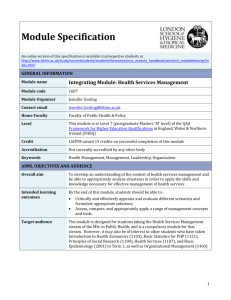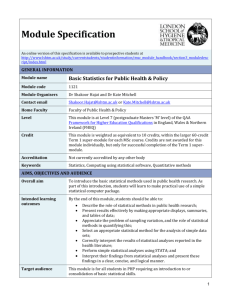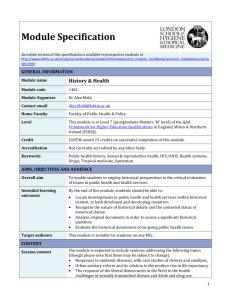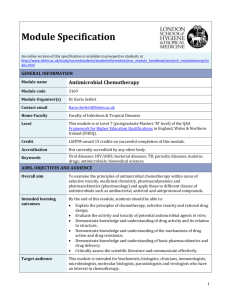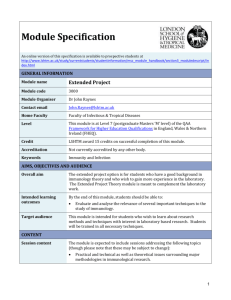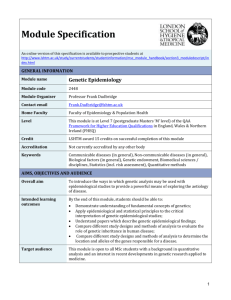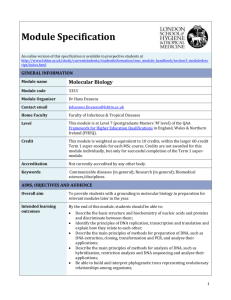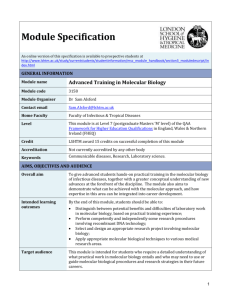3198 Applying Public Health Principles in Developing Countries
advertisement
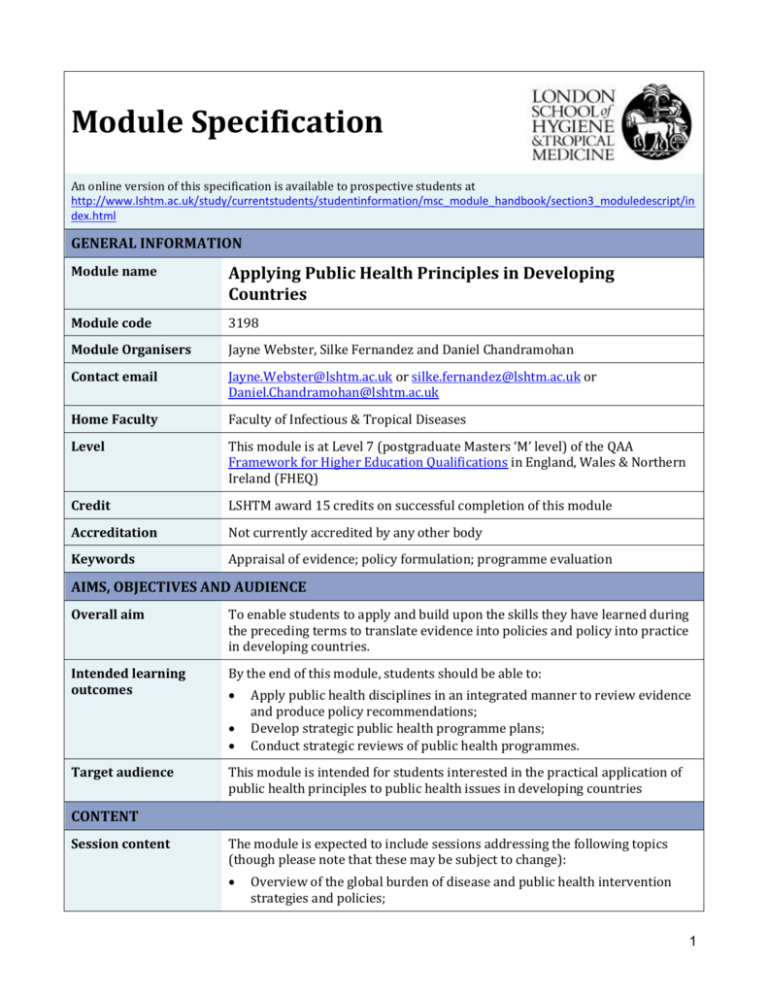
Module Specification An online version of this specification is available to prospective students at http://www.lshtm.ac.uk/study/currentstudents/studentinformation/msc_module_handbook/section3_moduledescript/in dex.html GENERAL INFORMATION Module name Applying Public Health Principles in Developing Countries Module code 3198 Module Organisers Jayne Webster, Silke Fernandez and Daniel Chandramohan Contact email Jayne.Webster@lshtm.ac.uk or silke.fernandez@lshtm.ac.uk or Daniel.Chandramohan@lshtm.ac.uk Home Faculty Faculty of Infectious & Tropical Diseases Level This module is at Level 7 (postgraduate Masters ‘M’ level) of the QAA Framework for Higher Education Qualifications in England, Wales & Northern Ireland (FHEQ) Credit LSHTM award 15 credits on successful completion of this module Accreditation Not currently accredited by any other body Keywords Appraisal of evidence; policy formulation; programme evaluation AIMS, OBJECTIVES AND AUDIENCE Overall aim To enable students to apply and build upon the skills they have learned during the preceding terms to translate evidence into policies and policy into practice in developing countries. Intended learning outcomes By the end of this module, students should be able to: Target audience Apply public health disciplines in an integrated manner to review evidence and produce policy recommendations; Develop strategic public health programme plans; Conduct strategic reviews of public health programmes. This module is intended for students interested in the practical application of public health principles to public health issues in developing countries CONTENT Session content The module is expected to include sessions addressing the following topics (though please note that these may be subject to change): Overview of the global burden of disease and public health intervention strategies and policies; 1 The process of developing evidence-based guidelines at WHO; Critical appraisal and interpretation of data from randomised controlled trials and observational studies for making public health policy; Applying the diverse mix of public health disciplines to different scenarios of current public health issues in developing countries; Use of health metrics for policy, monitoring and evaluation; Conducting reviews of health programmes; Approaches to monitoring and evaluation of delivery of interventions; Programme grant application and the review process; Procurement & Supply Chain Management; Human resources for health; Data needs and communication strategies for advocacy; Health economics for public health practitioners; Research into policy will broadly require the application of analytical (epidemiological, social science, economic and policy setting) skills to examine the evidence base and its sufficiency for appropriate policy development; Policy into practice will require the demonstration of strategic programme planning skills based on the specific policy and the implementation context; The strategic review of public health programmes component of the module will build on monitoring and evaluation principles and skills. TEACHING, LEARNING AND ASSESSMENT Study resources provided or required Copies of essential reading for each session will be included in the course reader. Teaching and learning methods A variety of teaching methods are used including lectures and practicals/seminars. Practical sessions focus on integrated application of the broad range of skills required to be a public health practitioner in a developing country. Assessment details Assessment will involve submission, by each student, of a policy discussion paper on a potential intervention that is currently considered to reduce disease burden in developing countries. The maximum word limit for the policy discussion paper is 2,500 words excluding references. For students who are required to re-sit, or granted a deferral or new attempt, the task will be the same as the original assessment but with a different topic. Assessment dates Assessments should be submitted on the last day of the module. For the academic year 2015-16 this will be 2.00 p.m. on Friday 20 May 2016. For students who are required to re-sit, or who are granted a deferral or new attempt, the next assessment deadline will be the standard Schoolrecommended date in mid/late September 2016. Language of study and assessment English (please see ‘English language requirements’ below regarding the standard required for entry). 2 TIMING AND MODE OF STUDY Duration The module runs for 5 weeks at 2.5 days per week; this module runs between Wednesday lunchtime and Friday afternoon. Dates For 2015-16, the module will start on Wednesday 20 April 2016 and finish on Friday 20 May 2016. Timetable slot The module runs in LSHTM timetable slot E. Mode of Study The module is taught face-to-face in London. Both full-time and part-time students follow the same schedule. For full-time students, other LSHTM modules are available in the other half of the week for the C and D slots. Learning time The notional learning time for the module totals 150 hours, consisting of: Contact time ≈ 44 hours Directed self-study ≈ 45 hours Self-directed learning ≈ 7 hours Assessment, review and revision ≈ 54 hours APPLICATION, ADMISSION AND FEES Pre-requisites Students must have a good understanding of epidemiology, statistics, social science and health economics. English language requirements A strong command of the English language is necessary to benefit from studying the module. Applicants whose first language is not English or whose prior university studies have not been conducted wholly in English must fulfil LSHTM’s English language requirements, with an acceptable score in an approved test taken in the two years prior to entry. Applicants may be asked to take a test even if the standard conditions have been met. Student numbers Student numbers are typically 70 per year; numbers may be capped due to limitations in facilities or staffing. Student selection Preference will be given to LSHTM MSc students, particularly those registered for specific courses or who have taken specific prior modules, where applicable, and LSHTM research degree students. Other applicants meeting the entry criteria will usually be offered a place in the order applications are received, until any cap on numbers is reached. Applicants may be placed on a waiting list and given priority the next time the module is run. Full Registration (full participation) by LSHTM research degree students is required for this module. Fees For registered LSHTM MSc students, fees for the module are included within MSc fees (given on individual course prospectus pages). If registering specifically for this module, as a stand-alone short course, individual module fees will apply. Tuition fees must be paid in full before commencing the module, or by any fee deadline set by the Registry. Scholarships Scholarships are not available for individual modules. Some potential sources of funding are detailed on the LSHTM website. 3 Admission deadlines For 2015-16: For registered LSHTM MSc students, the module choice deadline (for Term 2 and 3 modules) is Friday 20 November 2015. If registering specifically for this module, applications may be made at any time but, as places are limited, applications ahead of the MSc deadline are strongly advised. All applications should be submitted at the latest 8 weeks prior to the start of the module. Formal registration will take place on the morning of the first day of the module. ABOUT THIS DOCUMENT This module specification applies for the academic year 2015-16 Last revised 5 August 2014 by Daniel Chandramohan; Minor amendments 20 July 15 SDB London School of Hygiene & Tropical Medicine, Keppel St., London WC1E 7HT. www.lshtm.ac.uk 4

